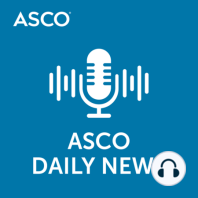12 min listen
Cancer Care for Ukrainian Refugees in Poland
FromASCO Daily News
ratings:
Length:
18 minutes
Released:
Mar 12, 2022
Format:
Podcast episode
Description
Host Dr. John Sweetenham, of the UT Southwestern Harold C. Simmons Comprehensive Cancer Center, interviews Professor Piotr Rutkowski, of the Maria Sklodowska-Curie National Research Institute of Oncology in Warsaw, Poland, about plans to provide cancer care for Ukrainians fleeing the war in Ukraine. Transcript Dr. John Sweetenham: Hello, I’m John Sweetenham, the associate director for Clinical Affairs at UT Southwestern’s Harold C. Simmons Comprehensive Cancer Center, and host of the ASCO Daily News Podcast. As many of you all know, 2 million people have now fled the war in Ukraine, according to the United Nations Refugee Agency—the UNHCR. Today, we’ll be discussing efforts underway in neighboring Poland to provide health care and other support to Ukrainian refugees, particularly for patients with cancer. It’s an honor to welcome Professor Piotr Rutkowski, who leads the department of Soft Tissue and Bone Cancer at the Maria Skłodowska-Curie National Research Institute of Oncology in Warsaw, Poland. He also serves there as the deputy director of the Institution for National Oncological Strategy and Clinical Trials. Additionally, Professor Rutkowski serves as the President-elect of the Polish Oncological Society. My guest and I have no conflicts relating to our topic today. Our full disclosures are available in the show notes, and disclosures relating to all guests on the podcast can be found on our transcripts at asco.org/podcast. Dr. John Sweetenham: Professor Rutkowski, thank you for coming on the podcast today. We are really pleased to have this opportunity to speak with you during what must be an incredibly difficult time. Dr. Piotr Rutkowski: Thank you for the invitation. That’s true, with this horrible time. And to be honest, we haven’t expected how it can be going on. But now we have a new reality, and we have to fight on. Dr. John Sweetenham: Just beginning with that new reality, my first question to you was going to be to ask you a little bit about details of the decisions made by Poland’s parliament. So, your parliament has adopted new legislation that provides health care for Ukrainian refugees and enables the creation of a call center at Poland’s National Health Fund. Could you give us some more details about these new developments, and how you anticipate this will help the Ukrainian refugees who are suffering, particularly those who are suffering with cancer? Dr. Piotr Rutkowski: Yes, that’s true. Until now, we have nearly 1 and a half million people from Ukraine who arrived in Poland during the last 2 weeks. And because of the increasing numbers of patients with cancer coming to our institution but also all the oncology call centers in Poland, the Polish parliament—together with the Polish National Health Fund decided that all refugees of war from Ukraine are authorized to receive health care the same as citizens of Poland. This is very important because it resolves a lot of bureaucratic issues. We do not need to get specific permission to treat the patients. And we can provide them the same care as every citizen of Poland, in terms of outpatient treatment, admission to the hospitals, surgical procedures, access to the drug, prescriptions of the drug . . . it is absolutely important. It also means that within the framework of this new law, we can treat the patients according to all the same regulations, or the same standards, as Polish oncological patients. Of course, I have to stress it, but Ukrainian oncological patients—except, of course—have no priorities. They are going to the same queue and [are under] the same care as Polish patients. Moreover, this is very important because for newly diagnosed oncological patients in Poland—we have so-called oncological cards, which allow for faster diagnosis including pathological evaluation, molecular evaluation, and imaging. So, they are undergoing the same diagnostic procedures as Polish patients. Of course, last week, we have admitted around 100 children in need of
Released:
Mar 12, 2022
Format:
Podcast episode
Titles in the series (100)
Hot Topics and Abstract Highlights From #GI22: Guest host, Dr. Muhammad Shaalan Beg, director for Gastrointestinal Medical Oncology at UT Southwestern's Harold C. Simmons Comprehensive Cancer Center and Dr. Manisha Palta, radiation oncologist at the Duke University Health System in North Carolina... by ASCO Daily News
